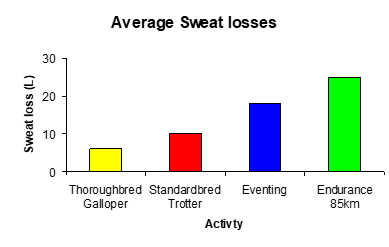Why do horses sweat?
Why is the process of sweating important?
The purpose of sweat is to maintain body temperature within normal, healthy limits. In order for the horse to sustain metabolism and derive energy required for movement, feed must be converted into fuel to feed working muscles and organs. The conversion of feed into fuel is very inefficient and results in the production of heat. In order to remove this heat, horses’ produce large volumes of sweat which aids cooling by evaporative loss from the skin surface. This process exerts a cooling effect while reducing the horses’ core temperature. It must be considered that when horses’ exercise at high intensities, this process is exaggerated and may result in increases in sweating rates by up to 15 litres per hour.

What is horse sweat made up of?
Sweat is predominately made up of the electrolytes (salts); sodium, chloride, potassium and lesser amounts of calcium, magnesium, sulphates and phosphates and also contain small amounts of protein. The concentration of electrolytes in horse sweat is much greater than that of blood plasma, making the horse more susceptible to sweating than other mammals such as humans. Importantly to consider is that the concentration of electrolytes within sweat will vary depending on the exercise being carried out and the aforementioned electrolytes are not lost in equal concentrations.
In addition to electrolytes, horse sweat also contains protein, inclusive of the detergent like latherin, which aid dispersal of sweat over the skin to maximise the surface area available for evaporative cooling. This is of great importance as evaporation of sweat from skin is responsible for 60-70% of cooling, while other mechanisms such as increased respiratory rate (blowing) after exercise provide further relief and evaporative losses.
Where are electrolytes stored in the body?
Electrolytes are contained within all the compartments of the body however the only ‘stores’ of electrolytes are held within the hindgut, which serves as a vital reservoir for fluid and electrolytes.
How crucial are electrolytes?
Electrolytes are essential to normal body function and are responsible for the following:
- Nerve and muscle interaction via electrical impulses
- Cardiac function and integrity
- Skeletal muscle action and efficacy
- Regulation and distribution of fluid throughout the body
- Adequate hydration/prevention of dehydration
- Co-ordination
- Prevention of metabolic distress i.e. poor performance, fatigue, heat stress, anxiety, in-co-ordination, poor recovery
It stands to reason that sweating occurs more in hotter climates, particularly when the horse is acclimatizing and also in high humidity when sweating becomes less efficient due to reduced evaporative cooling.
Sodium stimulates the thirst mechanism promoting fluid intake. Electrolyte supplementation will aid in maintaining fluid balance and hydration, while also promoting fluid intake. However, other factors associated with sweating losses may comprise the physiological processes of the body. Fluid loss via sweating acts to reduce the total blood volume, decreasing the availability of nutrients transported to working muscles and organs throughout the body. This can lead to detrimental effects on key performance factors, such as muscle function, nerve transmission and gastrointestinal absorption. Therefore, ensuring adequate fluid intake following exercise via electrolyte supplementation, will aid in replenishment of exercise induced deficits quickening the recovery process to enable optimal future performances.
What can I do to ensure optimal electrolyte provision?
Adequate electrolyte supplementation plays a valuable role in preventing metabolic distress and is a key factor in horse rations ranging from maintenance to elite performance.
- Supplementing electrolytes to rations daily is optimal. Ideally, electrolyte provision should be divided between morning and afternoon feeds to ensure greater utilization of electrolytes. Daily supplementation of Salkavite is ideal for maintaining electrolyte levels while also ensuring optimal provision of B-Group vitamins for the maintenance of appetite and efficient energy metabolism.
- Administer electrolytes according to exercise intensity and sweat loss. The hotter and more humid the climate, the greater amount of electrolyte to be supplied.
- Ensure provision of electrolytes while traveling to prevent dehydration and heat stress. Supplements such as Electro Paste are ideal for traveling as they are administered over the tongue via a pre-dosed syringe or added to drinking water
- Ensure electrolyte supplementation before and after exercise. It is necessary to hydrate horses prior to exercise to ensure optimal performance but also important to rehydrate after exercise to stimulate the thirst mechanism to encourage drinking and a speedy recovery
- Ensure constant access to fresh, clean drinking water before and after exercise
Experts in Equine Nutrition
Every product in the Ranvet range has been developed to meet a horse’s most specific need at any given time, be it in a training environment or on a breeding farm. Having pioneered the formulation of specific medications and dietary supplements for horses, the company is now recognised as a leader in the areas of equine health and nutrition.
